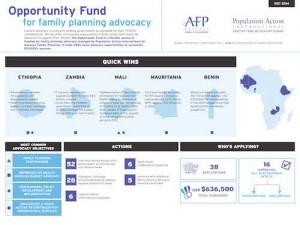
Originally posted on ALL ACCESS by Wendy Turnbull, Senior Advisor for International Advocacy, Population Action International
January 28, 2015
Commitments may get headlines, but advocates get results.
Advocacy and accountability efforts—both of a sustained and opportunistic nature—are central drivers of progress on Family Planning 2020 and the Ouagadougou Partnership (two global efforts to improve family planning access, choice, quality and rights).
- See more at: http://www.populationaction.org/blog/2015/01/27/seizing-advocacy-opportu...
Commitments may get headlines, but advocates get results.
Advocacy and accountability efforts—both of a sustained and opportunistic nature—are central drivers of progress on Family Planning 2020 and the Ouagadougou Partnership (two global efforts to improve family planning access, choice, quality and rights).
- See more at: http://www.populationaction.org/blog/2015/01/27/seizing-advocacy-opportu...
Commitments may get headlines, but advocates get results.
Advocacy and accountability efforts—both of a sustained and opportunistic nature—are central drivers of progress on Family Planning 2020 and the Ouagadougou Partnership (two global efforts to improve family planning access, choice, quality and rights).
Effective advocacy requires an organized and resourced civil society that can both work with government as well as keep a critical eye on the government, NGO and private sectors. And that requires funding.
Enter the Opportunity Fund. For the past two years, the Fund (an advocacy resource of Advance Family Planning) has supported civil society-led advocacy and accountability in developing countries. As managers of the Opportunity Fund, PAI’s focus is on emerging, high-impact advocacy opportunities that ultimately feed into broader, longer-term strategies. It’s exciting work, but it largely happens behind-the-scenes. So today, we’re pulling back the curtain to give you a sense of the Fund’s accomplishments and challenges (and a few surprises) during this past year.
Did you know?
Since May 2013, the Opportunity Fund by the numbers:
• 37 applications, mostly from sub-Saharan Africa. Another half-dozen arrived during the holiday break.
• 17 advocacy awards approved, all in sub-Saharan Africa
• $636,500 disbursed
• 10 Francophone, 7 Anglophone countries
◦ Mauritania (4 awards), Benin, Mali, Senegal, Burkina Faso, Togo, DRC
◦ Kenya (2 awards), Zambia (3 awards), Sierra Leone, Ethiopia
• 4 common advocacy themes
◦ Family planning task sharing
◦ Budget allocations and expenditures for contraceptives
◦ Subnational family planning policy development and implementation
◦ Adolescent and youth access to contraceptive information and services
 Click the image to see a larger version.
• 5 “quick wins” in Ethiopia, Zambia, Mali, Mauritania and Benin.
Surprises
• Relatively few queries and applications from Asia
• Majority of awards in Francophone countries, reflecting more opportunities at-hand for policy and funding change
• Steady increase in applications focused on family planning advocacy at a sub-national level
• Few applications on family planning task-sharing and adolescent and youth access, until recently
Lessons
• South-South strategizing and collaboration is invaluable—there is no substitute
• Clearinghouse function for policies and guidelines is needed
• Coalitions are key and resources need to be shared beyond the leader/secretariat
• Funding strategic advocacy is time-intensive
• Document, document, document—even the baby steps—to appreciate the advocacy progress being made.
• Revisit advocacy strategy often and revamp as necessary
A few months into Year 3, the Opportunity Fund is wrestling with the reality that a quick win often begets advocacy to ensure the win is sustained. How can we best plan for, assess, and prioritize these advocacy needs as they arise? More immediately, however, the Fund’s coffers have run dry due to the high volume of strong applications received. Discussions are underway with donors to replenish the Fund.
Advocacy progress by current Opportunity Fund recipients, meanwhile, continues. Expect significant national policy and funding wins in Zambia, Togo, Benin and Mauritania, and in two Kenyan counties, in the first half of 2015. By then, we hope the Fund will be ready to resume investing in civil society advocacy and accountability. Stay tuned!

